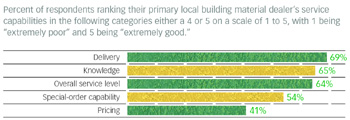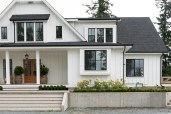But while pricing is an incentive for builders to go with one supplier over another, it rarely becomes the cement that bonds dealers or distributors to custom builders who, time and again, say they turn to suppliers they are comfortable with. “What I’m looking for in a supplier is open communications, integrity, follow-through, and attention to our particular account,” says Stephen Hann, owner of Houston-based Stephen K. Hann Custom Builders. “I guess it’s all about [a dealer’s] personal touch. The more they conform to our delivery process and minimize misunderstandings, the more valuable they are to us.”
When rumors surfaced a few years ago that the federal government was buying large quantities of panels to ship to Iraq, Dennis Dixon, who owns Dixon Builders in Flagstaff, Ariz., recalls getting a call from the owner of Hunt Lumber, a local yard Dixon has patronized for 21 years. “He asked me what my OSB needs would be for the next year” so Hunt Lumber could buy enough to set aside sufficient amounts for Dixon’s company, which does three projects a year that produce $2.7 million to $3.1 million in sales. Dixon says he’s received similar calls from Hunt Lumber when there have been shortages of PVC pipe, roofing, and rebar. “His salespeople are watching out for me.”
Katz Builders purchases windows from a local specialty dealer, Grand Openings, because it carries the Kolbe & Kolbe brand and because its salesperson, Steve Lobe, “understands construction and how windows go in,” says Katz. “When there’s a challenge for us, Grand Openings is on the spot. It’s almost like an insurance policy.”
Precious Resources Suppliers that consistently deliver what they promise are worth their weight in gold. And those that install what they sell can provide an added value that custom builders are beginning to accept, some out of necessity. Take Kitty Hawk, N.C.–based Stormont & Co., which specializes in building waterfront homes on the Outer Banks of North Carolina. “Like many coastal communities, it’s just going [crazy], so the towns here don’t have enough labor,” says owner Dave Stormont, who can’t afford production delays when homes he builds often need to be ready before summer renters descend. For a decade, he’s bought materials from one local pro dealer, Kellogg Supply, which offers turnkey service for cabinets and flooring. But Stormont also uses several other cabinet suppliers to make sure he’s offering home buyers enough variety and to be confident that the cabinets are installed in a timely fashion.
On a scale of 1 to 10, where 1 is “not at all important” and 10 is “extremely important,” far more custom builders rated “timely delivery” a 9 or 10 than they did any other factor that determines which supplier they buy from (see Figure 4, below left). In contrast, installed sales received a 9 or 10 score from only 32 of the 502 builders polled (6 percent), and ranked lower on builders’list of reasons for selecting suppliers than, say, after-sales support or special-order capabilities. But with nearly half of those polled saying they’re worried about being able to locate qualified subcontactors, that glaring market reality may drive custom builders to find suppliers that will install what they sell.
What Dalco’s Dalrymple says he looks for in a turnkey supplier is “professionalism, before and after the sale.” He notes that his company pulled some business from one long-time materials supplier in Livonia, Ga., when the quality of its installed work slipped. Dalrymple believes that suppliers that specialize in one or two products tend to be more reliable installers than those that sell multiple lines. He points to Dalco’s current window supplier, Atlanta-based Window Concepts, which he says “provides great installation service, especially after the job is completed.”
High Standards Custom builders are understandably careful about installations because their work is generally held to higher standards than production builders’ by home buyers who often have considerable say over what products get purchased. Home buyers are more savvy about products, colors, and styles because of their exposure to home improvement shows on TV, home-decorating magazines, and online information on just about anything that goes into a home’s construction. Rosenthal says that one of his customers recently requested a cable rail system with glass panels, which cost $48,000 for the railing alone. He also recently used a millwork source in Montana, Artisan Doors & Millwork, for a $3 million custom home project that called for 60 clear-alder wood doors costing $800 apiece.
Custom builders must be able to draw from a deeper reservoir of suppliers to meet the ever-growing demands of their clientele and their designers. “The architect is often the primary control point,” observes Ralph Dratch, director of business development for Koral Builders, a Southampton, N.Y.–based custom builder that produces 10 to 12 homes each year that sell for between $1.5 million and $4 million. Perry says that he sometimes chooses suppliers based on the branded products they stock because brand-conscious baby boomers “are our main clients” and they’re even asking for building products by name.


